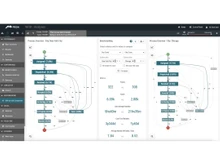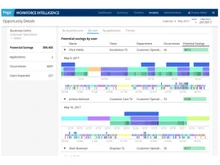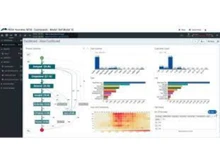When it comes to business process management (BPM) and low-code no code software, Pega and Appian emerge as two prominent players. Both platforms offer unique features and capabilities to streamline organizational workflows and drive digital transformation. In this detailed comparison, we will delve into the strengths, weaknesses, and distinguishing features of Pega and Appian across various dimensions.
Pega vs. Appian: Overview
Pega and Appian are both leading low-code BPM platforms that empower organizations to accelerate application development, automate business processes, and improve operational efficiency.
Pega is renowned for its comprehensive suite of BPM tools, advanced decision management capabilities, and AI-driven automation. Its unified platform allows for seamless integration of business rules, case management, and customer engagement, making it a preferred choice for enterprises seeking end-to-end process automation solutions.
Appian, however, provides an intuitive low-code development environment and rapid application deployment capabilities. It emphasizes agility and flexibility, enabling business users and developers to collaborate effectively in building and deploying applications without extensive coding knowledge.
Pega vs. Appian: Pros and Cons
- Both Pega and Appian offer AI and machine learning capabilities for their BPM tools. However, Appian provides relatively basic AI and automation capabilities compared to Pega.
- Pega BPM supports data collection systems and multiple CRMs. Whereas Appian BPM supports only Compatible datasheets.
- Pega BPM supports Windows, Linux, Mac, and Web-Based OS. On the surface, Appian BPM supports Windows, Android, iPhone, Mac, and web-based OS.
Pega vs. Appian: In Terms of Features
- Decision Management: Pega offers sophisticated decision management capabilities powered by AI and machine learning algorithms, enabling organizations to automate complex decision-making processes and optimize outcomes. On the other hand, Appian provides basic decision modeling tools and lacks the advanced AI-driven decision management capabilities offered by Pega.
- Low-Code Development: While Pega supports low-code development, its focus lies more on process automation and case management rather than rapid application development. On the other hand, Appian provides an intuitive low-code development environment, allowing business users to create applications quickly with minimal coding.
- Robotic Process automation: When it comes to robotic process automation, Appian is known for orchestration, while Pega stands out for its attended and unattended RPA features. However, Pega and some other Pega alternatives provide more extensive opportunities for AI-enabled automation thanks to its pre-built tools and customizable low-code development options.
- Security: Both BPM platforms work hard to make sure their cloud platforms are safe, dependable, and follow security rules. The main difference between Appian and Pega is that Appian brings in outside experts to check their platform's security, while Pega doesn't do this.
Pega vs. Appian: Integration Capabilities
Pega offers robust integration capabilities with a wide range of enterprise systems and APIs for seamless data exchange. Appian on the other hand, provides native connectors and integration plugins for popular enterprise systems. However, Appian’s integration capabilities are more extensive and robust compared to Pega.
Pega vs. Appian: Scalability and Performance
Pega is known for its scalability and ability to handle complex enterprise workflows and high-volume transactions with ease. Whereas Appian and some other Appian alternatives can effectively meet the needs of small to mid-sized organizations but may face challenges with extreme scalability requirements compared to Pega.
Pega vs. Appian: User Interface
Pega features a comprehensive user interface tailored to meet the needs of business users, administrators, and developers. On the surface, Appian offers an intuitive and a user-friendly interface with drag-and-drop capabilities, making it easy for users to design, deploy, and manage applications.
Pega vs. Appian: Customer Support
Pega offers comprehensive customer support services, including technical assistance, training programs, and a dedicated community forum for knowledge sharing. On the contrary, Appian provides customer support through various channels, including email, phone, live chat, and an online knowledge base. However, Appian’s 24*7 customer support and priority support gives it the upper hand over Pega.
Which is Better, Pega or Appian?
Both Pega and Appian are powerful BPM and low-code development platforms with distinct strengths and capabilities.
Pega is well-suited for large enterprises with complex process automation needs, advanced decision management requirements, and stringent security and compliance standards.
Appian, on the other hand, is ideal for organizations seeking agility, flexibility, and ease of use in application development, with a focus on rapid deployment and collaboration among business users and developers.
In the end, the choice between Pega and Appian depends on the specific requirements, preferences, and strategic objectives of each organization, as well as factors such as budget, scalability, and technical expertise.


 6 Ratings & 0 Reviews
6 Ratings & 0 Reviews



















